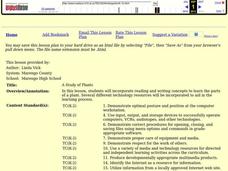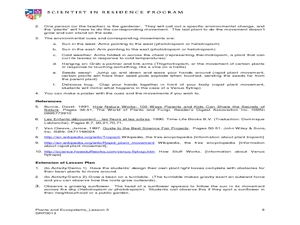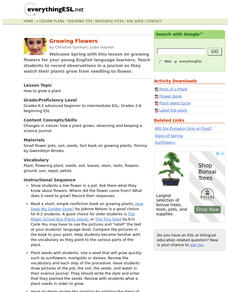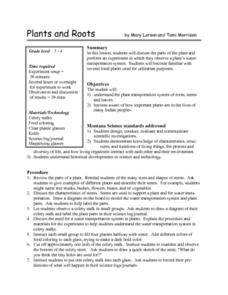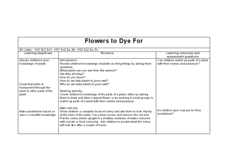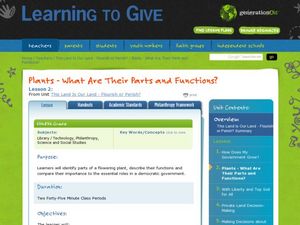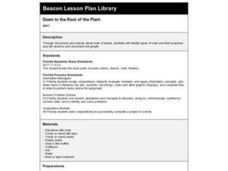Curated OER
A Study of Plants
Using a variety of multi-media resources, your high schoolers become familiar with the parts of plant and create a story about plants using vocabulary learned during their research of plants. Completed stories are published using the...
Curated OER
Plant Parts and their Function
Discover why plants are important to our world. View plant parts and categorize them as stems or buds. Students do a cut and paste of pictures of plants into correct categories. Students also plant a carrot top,and record...
Curated OER
Plant Power
Here is an opportunity for your first graders to take a close look at plants: what they need to survive, how they grow, and the names of each plant part. The book, Corduroy's Garden is used to open the lesson. Then, youngsters utilize...
Purdue University
Bio Inspired Design Paper Flowers
Can paper flowers have some of the same properties as real flowers? First, learners investigate how water is absorbed into a flower through capillary action by using real flowers, yarn, and paper. Then, they have an opportunity to create...
Curated OER
Parts of the Plants that we Eat
First graders study plants and their parts to see what parts are edible. In this plant lesson students are assigned plant parts and they are to put them in the right category.
Curated OER
Creating a Pollinator Garden
Students build a pollination garden. In this pollination lesson, students read directions and build a pollinator garden that will produce flowering plants for pollinator organisms to use in pollination of other plants.
Curated OER
Learning About Plants- Flowers for a Special Occasion
Students explore the parts of plants and discover that plants need to grow. In this plant lesson plan, students discuss the parts of the plant and plant petunias. Students can share their plants with friends or families.
Curated OER
Plants Alive! How Plants Grow and Move
Students explore how plants move in response to the environment. In this plant lesson, students engage in three different experiments to investigate how plants grow and move. Resources available in English and French.
Curated OER
1st Grade - Act. 17: Observing Plants Through a Journal
First graders observe plants and write and illustrate what they have learned in their discovery journal.
Curated OER
Plants and Animals
Students find common needs between plants and animals. In this plants and animals instructional activity students compare that both plants and animals need food and water. They also find the differences between plant and animal needs.
Science 4 Inquiry
Plant Structures Lab Stations
In China, hibiscus is known as the shoe flower because it is used to polish shoes, while in Hawaii, it is honored as the state flower. Young scientists learn about the structure and function of flowers. They dissect hibiscus...
Curated OER
Six Plant Parts
Students create a harvest burrito out of fruit, flowers, roots, stems, and more. In this plants lesson plan, students go out into the garden and identify the 6 plant parts.
Curated OER
It's All About the Roots
Students investigate the process of hydroponic agriculture. They grow beans in different hydroponic solutions, compare results and graph their observations.
Curated OER
See How They Grow: Plants And Their Parts
Students discuss what plants require in order to grow, identify plant parts and their functions and discuss a video about plants. They conduct a controlled experiment with bean seeds and then record and observe the bean plants.
Curated OER
Growing Flowers
Students grow flowers from seeds. They plant quick-growing seeds in a flower pot and consider what a seed needs to grow. They observe and record the growth of the planted seeds in science journals.
Curated OER
Plants and Roots
Learners discuss the parts of the plant and
perform an experiment in which they observe a plant's water
transportation system. They become familiar with
several local plants used for utilitarian purposes.
Curated OER
Plant Roots
Students discover the purpose of plant roots and how they move water through a vascular system. They conduct an experiment using colored water to observe the movement of water through the roots and stem of a plant in a controlled...
Curated OER
Flowers to Dye For
Students observe biology by completing a plant experiment in class. In this botany lesson, students discuss the anatomy related to a plant and how roots and stems are necessary to its survival. Students utilize food coloring and examine...
Curated OER
Life Cycle of a Plant: How Living Things Grow and Die
An engaging slide show for 2nd graders introduces them to the life cycle of plants. Students match up plant vocabulary words to their correct definition. Pairs of students play a vocabulary game, then students must draw and label leaves,...
Curated OER
Plants- What Are Their Parts and Functions?
Students learn about plants. In this plant function lesson, students label the parts of a plant and their functions. Students work in small groups to create three simile statements to relate to the function of essential plant parts....
Curated OER
Box Bouquet
Students discuss the advantages and disadvantages of of annuals and perennials. They compare the structures of plants such as stems, roots, and leaves. They draw a chalk flower pot, cut it out and glue it to a background using Crayola...
Curated OER
Down to the Root of the Plant
Second graders identify types of roots and their purposes and observe and document root growth. students observe their roots once a week and measure them to see if there has been any change. Each student keeps a written log of the...
Curated OER
Understanding the Roots
Learners investigate the parts of a flower. In this earth science lesson, students read the book The Magic School Bus Plants Seeds and identify various plant parts. Learners construct a model of a flowering plant from various art supplies.
Curated OER
How Plants Spice Up Our Lives
Third graders study plants. In this biology lesson plan, 3rd graders label and identify parts of plants, identify spices obtained from plants, and determine what part of a plant a spice comes from by using taste, touch, smell and sight.


